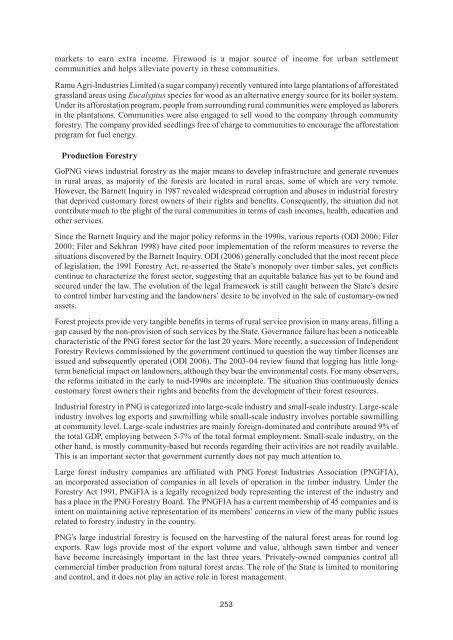Contribution of Forestry to Poverty Alleviation - APFNet
Contribution of Forestry to Poverty Alleviation - APFNet
Contribution of Forestry to Poverty Alleviation - APFNet
Create successful ePaper yourself
Turn your PDF publications into a flip-book with our unique Google optimized e-Paper software.
markets <strong>to</strong> earn extra income. Firewood is a major source <strong>of</strong> income for urban settlement<br />
communities and helps alleviate poverty in these communities.<br />
Ramu Agri-Industries Limited (a sugar company) recently ventured in<strong>to</strong> large plantations <strong>of</strong> afforestated<br />
grassland areas using Eucalyptus species for wood as an alternative energy source for its boiler system.<br />
Under its afforestation program, people from surrounding rural communities were employed as laborers<br />
in the plantations. Communities were also engaged <strong>to</strong> sell wood <strong>to</strong> the company through community<br />
forestry. The company provided seedlings free <strong>of</strong> charge <strong>to</strong> communities <strong>to</strong> encourage the afforestation<br />
program for fuel energy.<br />
Production <strong>Forestry</strong><br />
GoPNG views industrial forestry as the major means <strong>to</strong> develop infrastructure and generate revenues<br />
in rural areas, as majority <strong>of</strong> the forests are located in rural areas, some <strong>of</strong> which are very remote.<br />
However, the Barnett Inquiry in 1987 revealed widespread corruption and abuses in industrial forestry<br />
that deprived cus<strong>to</strong>mary forest owners <strong>of</strong> their rights and benefits. Consequently, the situation did not<br />
contribute much <strong>to</strong> the plight <strong>of</strong> the rural communities in terms <strong>of</strong> cash incomes, health, education and<br />
other services.<br />
Since the Barnett Inquiry and the major policy reforms in the 1990s, various reports (ODI 2006; Filer<br />
2000; Filer and Sekhran 1998) have cited poor implementation <strong>of</strong> the reform measures <strong>to</strong> reverse the<br />
situations discovered by the Barnett Inquiry. ODI (2006) generally concluded that the most recent piece<br />
<strong>of</strong> legislation, the 1991 <strong>Forestry</strong> Act, re-asserted the State’s monopoly over timber sales, yet conflicts<br />
continue <strong>to</strong> characterize the forest sec<strong>to</strong>r, suggesting that an equitable balance has yet <strong>to</strong> be found and<br />
secured under the law. The evolution <strong>of</strong> the legal framework is still caught between the State’s desire<br />
<strong>to</strong> control timber harvesting and the landowners’ desire <strong>to</strong> be involved in the sale <strong>of</strong> cus<strong>to</strong>mary-owned<br />
assets.<br />
Forest projects provide very tangible benefits in terms <strong>of</strong> rural service provision in many areas, filling a<br />
gap caused by the non-provision <strong>of</strong> such services by the State. Governance failure has been a noticeable<br />
characteristic <strong>of</strong> the PNG forest sec<strong>to</strong>r for the last 20 years. More recently, a succession <strong>of</strong> Independent<br />
<strong>Forestry</strong> Reviews commissioned by the government continued <strong>to</strong> question the way timber licenses are<br />
issued and subsequently operated (ODI 2006). The 2003-04 review found that logging has little longterm<br />
beneficial impact on landowners, although they bear the environmental costs. For many observers,<br />
the reforms initiated in the early <strong>to</strong> mid-1990s are incomplete. The situation thus continuously denies<br />
cus<strong>to</strong>mary forest owners their rights and benefits from the development <strong>of</strong> their forest resources.<br />
Industrial forestry in PNG is categorized in<strong>to</strong> large-scale industry and small-scale industry. Large-scale<br />
industry involves log exports and sawmilling while small-scale industry involves portable sawmilling<br />
at community level. Large-scale industries are mainly foreign-dominated and contribute around 9% <strong>of</strong><br />
the <strong>to</strong>tal GDP, employing between 5-7% <strong>of</strong> the <strong>to</strong>tal formal employment. Small-scale industry, on the<br />
other hand, is mostly community-based but records regarding their activities are not readily available.<br />
This is an important sec<strong>to</strong>r that government currently does not pay much attention <strong>to</strong>.<br />
Large forest industry companies are affiliated with PNG Forest Industries Association (PNGFIA),<br />
an incorporated association <strong>of</strong> companies in all levels <strong>of</strong> operation in the timber industry. Under the<br />
<strong>Forestry</strong> Act 1991, PNGFIA is a legally recognized body representing the interest <strong>of</strong> the industry and<br />
has a place in the PNG <strong>Forestry</strong> Board. The PNGFIA has a current membership <strong>of</strong> 45 companies and is<br />
intent on maintaining active representation <strong>of</strong> its members’ concerns in view <strong>of</strong> the many public issues<br />
related <strong>to</strong> forestry industry in the country.<br />
PNG’s large industrial forestry is focused on the harvesting <strong>of</strong> the natural forest areas for round log<br />
exports. Raw logs provide most <strong>of</strong> the export volume and value, although sawn timber and veneer<br />
have become increasingly important in the last three years. Privately-owned companies control all<br />
commercial timber production from natural forest areas. The role <strong>of</strong> the State is limited <strong>to</strong> moni<strong>to</strong>ring<br />
and control, and it does not play an active role in forest management.<br />
253


